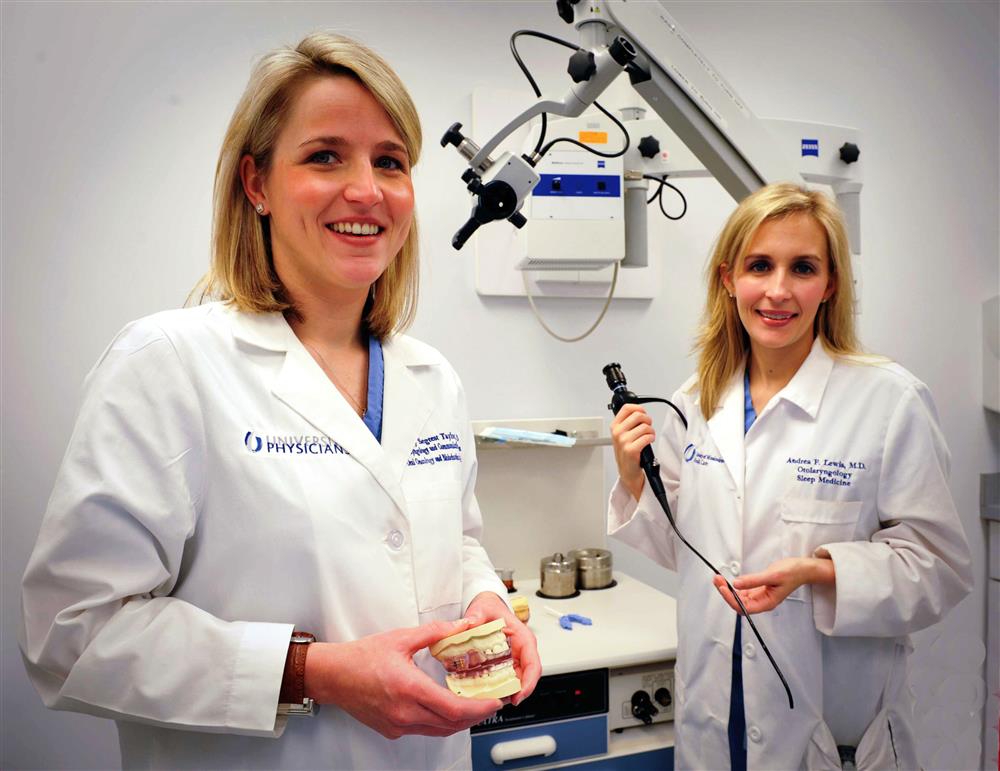UMMC medical team provides multidisciplinary approach to sleep apnea

Physicians and dentists at the University of Mississippi Medical Center have developed a multidisciplinary team approach to treating sleep apnea, which they hope will provide patients with an improved quality of life.
From the sleep study to the various treatment options of medications, dental appliances or surgery, the medical team evaluates each patient to individualize the treatment plan. This specialized group of professionals will treat a common sleep disorder that impacts thousands of Mississippians and millions of people nationally.
Sleep apnea is caused when a patient stops breathing during sleep, which results in serious, and potentially life-threatening, health consequences such as high blood pressure, an irregular heartbeat, heart attack and stroke.
The American Stroke Association released a report this month that linked severe sleep apnea to stroke and small lesions in the brain. Having more than five sleep apnea episodes per night was associated with silent strokes, and more than a third of the study participants with white matter lesions had severe sleep apnea.
"Sleep apnea is a unique niche. It's a field where people weren't being treated adequately," said Dr. Andrea Lewis, assistant professor of otolaryngology and communicative sciences.
Lewis is one of three physicians nationally who completed residency training in otolaryngology and a fellowship in sleep medicine. Ear, nose and throat physicians often treat patients with sleep disorders, and Lewis said the fellowship gave her greater insights into how to help these patients.
"A lot of people don't think they have sleep apnea or they just snore and nothing can be done about it," Lewis said. "There is more we can offer these patients."
Medications are generally not effective in the treatment of sleep apnea. Therapy for sleep apnea is specifically designed for each patient because the symptoms and health effects vary. Lewis coordinates treatment with the sleep study center at University Physicians-Northeast Jackson.
Dr. Alp Baran, professor of psychiatry, is director of the Sleep Disorders Center. He prescribes positive airway pressure, which is the first-line treatment for sleep apnea. It may not work for all patients.
In mild cases of sleep apnea, behavioral therapy may be all that is needed. The patient may be advised to lose weight or to avoid the use of alcohol, tobacco and sleeping pills.
If behavioral therapy doesn't relieve symptoms, nasal continuous positive airway pressure (CPAP) may be recommended. CPAP is a procedure in which the patient wears a mask over the nose during sleep, and pressure from an air blower forces air through the nasal passages.
Lewis said that CPAP can be effective with long-term use, but about two-thirds of people who need it don't do it consistently and use decreases over time. Other patients who have chronic nasal congestion sometimes have trouble wearing the mask.
Dental appliances that reposition the lower jaw and the tongue also have been helpful to some patients with mild-to-moderate sleep apnea. Dr. Shelley Taylor, a dentist and assistant professor of otolaryngology, works with Dr. Harold Kolodney, a maxillofacial prosthodontist and professor of otolaryngology, to fit patients with appliances called mandibular advancement devices. Referrals usually come from either Lewis or the sleep medicine center.
"They are designed with an upper and lower appliance that positions the lower jaw in a more forward position," Taylor said.
Soon after joining UMMC, Taylor had a close friend who had a heart attack that was attributed to his sleep apnea. She decided to gain additional education and experience so that she would be able to provide a service to these patients. Traditionally, patients were offered CPAP with no other options.
Multiple surgical procedures also are available and include the removal of adenoids and tonsils, nasal polyps or tissue that's blocking the airway.
"There are better surgical options now than 30 years ago," Lewis said. "These modern options are less invasive, with improved effectiveness and faster recovery."
The surgeries usually involve increasing the space in the back of the throat or under the tongue and increasing the nasal airway space. Surgical reconstruction for deformities of the lower jaw also may benefit some patients.
Dr. Ron Caloss, director of the Oral and Maxillofacial Residency Program, works with the team to address the surgical reconstruction for deformities of the jaws that also may benefit some patients. The procedure is maxillomandibular advancement.
"It's indicated for patients who have not done well with positive airway pressure and have severe apnea," Caloss said. "Severe apnea is defined as greater than 30 episodes an hour during sleep. This procedure has been shown to be effective in these patients."
Caloss said that few medical centers in the country have made such efforts to develop a multidisciplinary sleep disorder treatment program.
"The Medical Center should be proud," he said.


